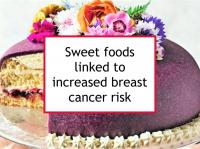It is well established that type 2 diabetes, a condition characterized by abnormally high levels of blood sugar, is a risk factor for breast cancer. Less well known perhaps is that repeated episodes of high blood sugar can increase breast cancer risk. This has been reported to be true even for lean women without diabetes.
In fact, diets with high glycemic load appear to increase the risk of breast cancer even in women who are not overweight. Previous studies have reported that relatively high consumption of sweets and sodas increase the risk of breast cancer. For example, one 2006 Italian study found that consumption of sweet desserts and sugary foods was positively associated with the risk of breast cancer, even after adjusting for body mass index. Now a large new prospective Icelandic study has reported that older women who reported high consumption of cookies, cakes, candy, sweet juice and other high-sugar foods and beverages were at increased risk of breast cancer.
Sugar and breast cancer
The association between high-sugar foods and beverages and risk of breast cancer has been explained as the result of an insulin-related mechanism since consuming sweet foods causes a temporary rise in circulating insulin. High insulin exposure is thought to increase the risk of breast cancer. However, there is some evidence that high glucose in and of itself can interact with cancer cells in ways that promote their growth.
However, the idea that breast cancer is "fed by sugar" is at best a partial explanation for the association between sugar consumption and breast cancer risk and recurrence. Sucrose is converted to glucose by enzymes in the digestive tract. All of our cells require energy in the form of glucose to survive. It is true that cancer cells typically consume glucose at a much higher rate than normal cells. Furthermore, compounds that cause inhibition of glucose uptake by tumor cells can inhibit their growth and viability. However, cancer cells will obtain glucose from a variety of foods in the diet, not just sugar. Sugar appears to act in direct ways to promote breast cancer, not just as a fuel for cancer cell metabolism and growth.
Latest research links sweet foods & beverages to increased breast cancer risk
The study referenced above was designed to investigate the association between dietary patterns late in life and risk of breast cancer. To conduct the study, the authors used data from the AGES-Reykjavik study and the Icelandic Cancer Registry. The study included 3,326 women born between 1908 and 1935 who provided information between 2002 to 2006 on then-current dietary habits using a food questionnaire. Statistical component analysis was used to determine six dietary patterns and adherence to each pattern was divided into three groups (lowest, middle and highest tertiles). Breast cancer diagnosis, if any, was determined through 2014 (average follow-up of 8.8 years).
A total of 102 (3.3%) study participants were diagnosed with breast cancer during follow up. Two of the six dietary patterns were found to be associated with breast cancer risk. Women in the highest tertile of adherence to a sweet dietary pattern (high consumption of cookies, cakes, pastries, candy, sweet juice and soda) were found to have 1.7 times the risk of breast cancer as women in the lowest tertile. Women in the middle tertile of a milk plus meat pattern (high consumption of meat and milk and low intake of fish) had almost double the risk of breast cancer as women in the lowest tertile. Note that free range, grass-fed lamb (often smoked) is the most commonly consumed meat in Iceland. The authors conclude that a diet rich in refined sugar and fat (used to prepare cookies, cake and pastries) might increase breast cancer risk. A diet in which meat and milk are heavily represent but fish is largely absent might also be linked to higher breast cancer risk, according to the authors.
